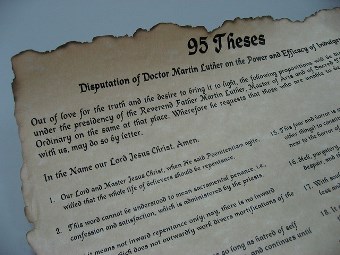ORGANIC FRUIT
What is Behind the Protestant Catholic Conflict?
By Stephanie Ismer


Single Page/Printer Friendly

Catholics and Protestants have been arguing (both violently and non-violently) for centuries. What is really behind the Protestant Catholic conflict? Aren't we all Christians? After all, both religions find their origin in the Acts 2 church. Is it just that we need to be more tolerant of each others' interpretations of Scripture? Are we squabbling about non-essentials?
Paul the Apostle says this by inspiration of the Holy Spirit:
I am astonished that you are so quickly deserting him who called you in the grace of Christ and are turning to a different gospel — not that there is another one, but there are some who trouble you and want to distort the gospel of Christ. But even if we or an angel from heaven should preach to you a gospel contrary to the one we preached to you, let him be accursed. As we have said before, so now I say again: If anyone is preaching to you a gospel contrary to the one you received, let him be accursed. Galatians 1:6-9Let him be accursed? Pretty strong stuff. Why is Paul getting so upset about this? And do Catholics really preach "another gospel"?
Throughout the history of Christianity, there has been a lot of strife between the Protestant and Catholic churches, and one of the big reasons for this conflict is a differing understanding of the gospel. I would like to try to shed some light on this, because I think it is very important that we know what the gospel is and what it is not, and why it matters.
First, at the heart of the conflict is the meaning of the words "repent and believe." Jesus said we should "repent and believe in the gospel" (Mark 1:15). We all recognize that Christians do not become sinless once they have believed. Believing in the gospel does not eliminate sin. This is a common point of confusion. The traditional Catholic position is that we 1) repent of sins and 2) believe. The biblical Christian view is that we 1) repent of self-effort and 2) believe. For the Catholic, sins (all the things we do that are contrary to the Law) are the issue. For the Protestant, the desire to justify oneself by the Law is the issue.
If you interpret Jesus' words to mean "repent from sins," you wind up trying even harder, by human effort, to justify yourself. Fear of God is supposed to lead to wisdom (Proverbs 9:10), the understanding that we are unable to do what is required (Galatians 3:24), and an attitude of humility before Him that calls out in faith for salvation. Only then, can love and gratitude enter the heart, and drive away fear (1 John 4:18). But the attempt to self-justify throws a monkey-wrench in the works. Seeing God's displeasure with sin, we cringe, and instead of taking hold of the gift by faith, we hold on to our self-effort, winding up further away from the Grace we need. The Catholic church is simply brilliant at encouraging and furthering this mindset. Each person experiences it differently, but in general, it goes something like this:
1. You believe that Jesus died for you (but you aren't quite sure what that means)
2. Every time you commit a sin, you think that God will be unhappy with you
3. You feel conflicted, wondering why you like to sin so much, but you remember that you love Jesus, and you don't want to make Him sad, because after all, He died for you
4. You do penance for sin in the form of prayer, confession, tears, guilt, etc. fully aware that you will sin again soon, but trusting that your confession and guilt about it will be acceptable to God
5. You find further assurance in the fact that you are a nice person who does nice things
6. You repeat the pattern, ad infinitum
Now, to be fair, it's not just the Catholic church that promotes this oppressive mindset and calls it the Gospel. Many, many Protestant or Evangelical churches are heavy on legalism too. But the original purpose of Protestantism (the Reformation) was to defy legalism and promote a biblical gospel — a gospel that relies entirely on God's work. Repentance means not "self-denial" but "denial of self-effort" and relies, by faith, entirely in Christ's effort. Here is the wonderfully freeing pattern that results from this:
1. Recognize that nothing you do, or don't do, affects your eternal destination (Romans 3:20)
2. Recognize that nothing you do, or don't do, affects your eternal destination (Romans 3:28)
3. Really grasp the fact that nothing you do, or don't do, affects your eternal destination (Galatians 2:16)
4. Fall at the foot of the cross and accept the amazing free gift of Grace (Ephesians 2:8-9)
5. Feel a genuine love for God flowing out of the reality of this Grace (Romans 11:32-36)
6. Love others because God has loved you, thus fulfilling the whole Law (Romans 13:8)
You don't have to do anything. Not now, not ever (Hebrews 10:10). There is no purgatory to go through, there is no Mass to perform, there is (dare I say it) not even any need for confession. There is only Christ and what He has done. Your conscience is purified (Hebrews 9:9b-14). No consciousness of sins is left (Hebrews 10:2). There is now no condemnation (Romans 8:1). You are dead, Christ lives in you, and you live by faith (Galatians 2:20). There is now only faith, working itself out through love (Galatians 5:6).

Continue to Page Two
Published 7-7-11; Revised 6-3-15

